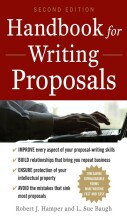Summary: Handbook For Writing Proposals, Second Edition | 9780071746496 | Robert J Hamper, et al
- This + 400k other summaries
- A unique study and practice tool
- Never study anything twice again
- Get the grades you hope for
- 100% sure, 100% understanding
Read the summary and the most important questions on Handbook For Writing Proposals, Second Edition | 9780071746496 | Robert J. Hamper; L. Sue Baugh
-
1 Where to begin
This is a preview. There are 1 more flashcards available for chapter 1
Show more cards here -
What is a proposal?
Is primarily a sophisticated sales and marketing piece develop to define a clients problem and/or opportunities and to sell the client on your ability to provide solutions and strategies to their satisfaction. -
What different type of proposals exist?
- Internal Proposals written within a company by a particular division, department, group, or individual to persuade top management to support an idea or project
- Solicited Proposals invited to submit a proposal. a request for proposal (RFP), request for quotation (RFQ) or bid invitation.
- Unsolicited Proposals most risky to write, They may considerable time and effort to develop with no guarantee that a client will be interested in the product or service offered.
- Sole-Source Contracts In some instances, a government agency, private firm, or association will contract with only one company to supply a product or service. This
-
What is a RFI?
Start of the RFP process with a request for information. Basically, the client wants to find out:- Whether the requirements for a job they need to have done reasonable.
- Whether the appropriate technology for the job exists.
- Whether solutions the client is considering are realistic.
- Whether you and other firms can meet the requirements of the job.
Clients may ask you to point out potential problems, evaluate available technology, and critique the client's project goals, schedules, and cost estimates. -
What is a RFQ about?
The client provides more detailed requirements than those found in an RFP and may even specify how those requirements are to be met You would be asked to supply specific for each part of the work including staffing, benchmarks, a detailed breakdown of projected hours and costs. -
How is the decision making proces look like after a RFP arrives?
- it must be reported to the person responsible for that the individual may be a vice president, contracts officer, program manager. 'j'bis policy ensures that no one sits on an RFP or contract bid and loses valuable time.
- Management should call a bid-decision meeting to assess whether a proposal should be written.
- proposals should be assigned to those staff members most qualified to address the clients' concerns.
- a specified area for the assembled team in which to work and be free from distractions or interruptions.
-
Each proposal is assessed on the next criteria
- does the proposal support your business and marketing plans ?
- Does this project fall into your organization's area of expertise?
- Does your background research on the project point out where your firm has a competitive edge over other companies?
- Have you worked for the client before or Had significant contact with the client on other jobs?
- Can yow assemble a proposal team and provide them with enough support and dedicated time to get the job done?
- is there a realistic chance that your firm will receive, the contract?
-
Which elements should a wining proposal at least contain?
- Evidence that you clearly understand the client's problem and situation.
- A strategy and program plan or design that the client feels will solve the problem and. produce the desired results.
- Clear documentation of your firm's qualifications and capabilities for carrying out the program plan.
- Evidence that your firm is reliable and dependable.
- A convincing reason why the client should choose your firm over all the other firms competing for the job.
- "your proposal should look like a winner
-
2 9~Step Proposal Process: An Overview
This is a preview. There are 2 more flashcards available for chapter 2
Show more cards here -
What major skills need you to create a winning proposal?
- Marketing and sales expertise
- Creative and analytical abilities
- Decision-making skills
- Interpretive skills
- Expertise in various subject areas
- Communication expertise
- Interpersonal skills
-
3 Selecting the Bid and Choosing the Proposal Team
This is a preview. There are 5 more flashcards available for chapter 3
Show more cards here -
What are three basic cost to be considered before starting analyzing a RFP?
- Financial cost: researching, writing, and producing a proposal.
- Opportunity cost: If you pursue a dubious RFP, you can't pursue other business that might bring you more success.
- Morale cost: If sa blow to morale when all that effort results in the proposal Hosing out to the competition.
-
What three purposes serves declining a job in writing a proposal?
- for future jobs
- for highlight your company's strengths
- for creating goodwill
- Higher grades + faster learning
- Never study anything twice
- 100% sure, 100% understanding

































